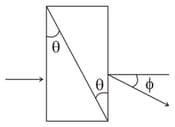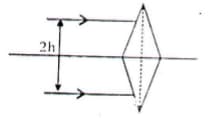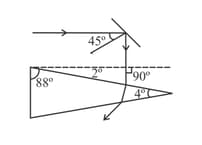Prism
Prism: Overview
This Topic covers sub-topics such as Prism, Angle of Prism, Dispersive Power, Dispersion of Light in Prism, Condition for Minimum Deviation in Prism, Refractive Index Formula for Prism, Deviation by Prism and, Deviation versus Incident Angle Graph in Prism
Important Questions on Prism
It is desired to make an achromatic combination of two lenses and . If the combination of lenses is converging then
The refractive indices of flint glass prism for violet, yellow and Red colours are , and respectively, find dispersive power of the flint glass. (upto five decimal places)
A parallel beam of white light falls on a convex lens. Images of violet, yellow and orange light are formed on the other side of the lens at distances and respectively. What is the dispersive power of the material of the lens ? (Round off your answer upto two decimal places)
Assertion : Dispersive power of an equilateral triangular prizm is greater than a thin lens if both are kept in air
Reason : Despersive power is is valid only for thin prizm, but not valid for a lens
For a material medium, the values of refractive index for violet and red colours are given as and . The dispersive power of a prism made out of this material is
A light ray through a glass prism of angle under goes a minimum deviation of . What is the speed of light in the prism?
(Assume speed of light in air)
Two lenses having focal lengths and when put in contact behave like convex lens. If they have zero longitudinal chromatic aberration, the ratio of dispersive powers is:
Consider the four different cases of dispersion of light ray which has all the wavelengths from to The dotted line represents the light ray of wavelength . Which ray diagram is showing maximum dispersive power?
Two identical prisms with slightly different indices are located as shown. Angle is small. When a laser beam strikes one of the prisms perpendicular to the surface, the refracted ray is deviated by a small angle The difference between the indices of refraction of the prism in terms of and

A ray of light passes through an equilateral prism such that angle of incidence is equal to angle of emergence and the latter is equal to of the angle of prism. The angle of deviation is (in)
Find angular dispersion due to glass prism of refracting angle . Refractive index for red and violet light is given as and respectively.
What is the relation between and when a prism is in the position of minimum deviation?
If the yellow light is refracted by a prism at an angle of minimum deviation then-
A ray passes through an equilateral glass prism such that which is of the prism angle. Then deviation will be -
A small angle prism gives a deviation of . The angle of prism is
If the retractive index vs wave length for a thin prism be as shown in figure. Then the graph of angle of deviation vs graph is best represented by
Calculate the dispersive power for crown glass from the given data
and
Two identical thin isosceles prisms of refracting angle 'A' and refractive index m are placed with their bases touching each other. Two parallel rays of light are incident on this system as shown. The distance of the point where the rays converge from the prism is

A ray of light strikes a plane mirror at an angle of incidence as shown in the figure. After reflection, the ray passes through a prism of refractive index 1.50, whose apex angle is . The angle through which the mirror should be rotated if the total deviation of the ray is to be is.

